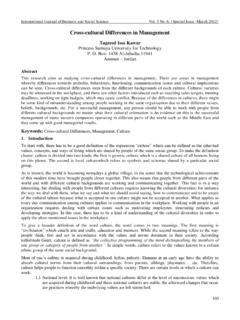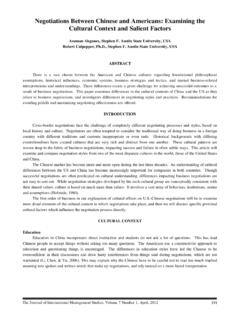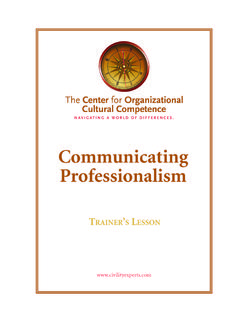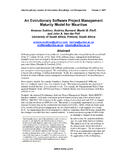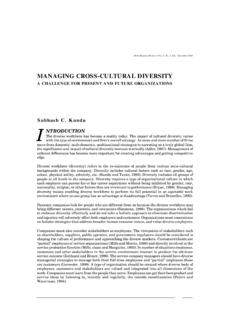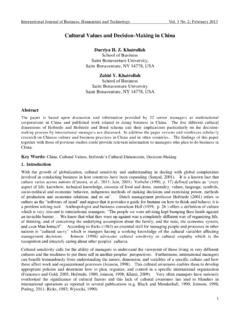Transcription of Cultural and gender diversities affecting the ship/port ...
1 ISPIC, Bremen 19-21 May 2008. Cultural and gender diversities affecting the ship/port interface Maritime education and training efforts to bridge diversity gaps Jan Horck Assistant Professor World Maritime University Box 500, 201 24 Malm , Sweden Phone +46-40-356345 Fax +46-40-128442 Author s brief biography Jan Horck is a Swede; Master Mariner, authorized maritime lecturer, MSc Ed and holder of a Licentiate from Lund University. He has fifteen years of sea service in Brostr m shipping company. In 1982 he took part in the pre-planning of World Maritime University and is today an Assistant Professor being a facilitator mainly to the students in the Maritime Education and Training course and the two commercial courses Port and Shipping Management. He is a visiting lecturer at the IMO/IMA in Trieste and at TUW Academie Middle East in Dubai. Horck has delivered papers at IAMU, IMLA and BIMCO seminars.
2 ABSTRACT Shipowners are aware that a multicultural crew complement can have a costly ending. Port and terminal operators find the ship interface communication cumbersome because of reciprocal mediocre English and lack of Cultural awareness. To teach and study in a multicultural context easily can lead to misunderstandings and have a negative impact on assessment. This paper intends to be a wakeup on above challenges found to be one direct and indirect reason to maritime accidents and incidents. Emotional responses to dilemmas regarding mixed cultures are meant to be reduced with education in Cultural awareness and Cultural sensitivity training. The paper reviews challenges for maritime education and training institutions to be proactive and meet an industry need for better crew communication. Shipowners cannot take the risk having a ship detained because of substandard crew.
3 A crew member not being able to communicate easily becomes alienated and thereby a safety risk. Often, research studies on the human element rather confuse the industry instead of giving useful guidance; research results contradict. Most likely, the mustering of multicultural ships crew is an irreversible trend. If courses in Cultural awareness do not become mandatory and if ships crews English is not improved the International Ship Management Code will be a farce. Key words: culture, women, Cultural awareness, education, SPI, MET 1 ISPIC, Bremen 19-21 May 2008. 1 INTRODUCTION In the 20th century the shipping industry was challenged with multicultural ships crews. In fact, it is not a new phenomenon in shipping; an industry that in many hundred years has been operating in a global setting. Most probably the roots of this new challenge can be found in the fact that many shipowners (in the following: owners) take full advantage of a minimum crew complement.
4 The reason for this, of course, is economic. The port industry is also affected by multicultural ships crews. Ports are directly concerned with ships calling and in some countries from guest workers with a different ethnic and Cultural background than the indigenous workers. An additional problematic issue to differences in culture is operational managers and stevedores possible weak English. Therefore, in the ship port interface (SPI) there are several opportunities for lack of communication and misunderstandings. A third possible challenge is the gender interface between the ship and the port. A typical example of misunderstandings is the Trade Daring loading iron ore in Ponta da Madeira Brazil in 1994. The ship broke in two pieces. Because of the actual construction of the ship and the handling of the ship in heavy weather it becomes subject to structural failures and steel stresses; cracks.
5 Generally, this is not the only reason for ships cracks. Improper loading/unloading including the miscommunication between the port terminal manager and the chief officer, both not understanding each other when planning the cargo operation, the ship also becomes subject to cracks. Many bulk carriers have this later phenomenon as a major reason for total loss. Coordination dilemmas are often due to lack of communication. When procedures and checklists are not followed severe damages can follow. Another example of miscommunication is the loss of the Eurobulker X that also broke in two, in 2000, while loading cement at the port of Lefkandi Greece. The ship had a mixed crew. The report states that the management and operation of Eurobulker X was most careless. The casualty report does not directly say but the reason for the negligence could very well be a combination of ship s and port s staff lack of Cultural awareness and weak English.
6 A deeper inter-personal reason for maritime accidents is seldom reported. Even if it is mentioned as an investigation issue in the International Maritime Organization (IMO) Resolution A884(21) as amended in Resolution A849(20); Code of Marine Casualties and Incidents. It appears that the casualty investigators rarely ask about the social relation between the persons involved in an accident either at or before the accident. But I understand it is becoming a practise. Casualty reports, where the reason for an accident is the human element (HE), summarise with a short remark: lack of communication (Horck, 2006). With the absence of public in depth analyses of accidents it follows that there are no identifiable concrete examples on how the challenges of lack of Cultural awareness and crew weak English are really met.
7 INTERTANKO and INTERCARGO has working groups that discusses the HE including other elements considered substandard in the SPI. INTERTANKO has a members Terminal vetting database and INTERCARGO has a Bulk Carrier Terminal Reporting Form. Both these resources are for members use. Several studies show that crews not mastering the English language and crews lack of Cultural awareness have been the direct or indirect reason for maritime accidents and incidents (Improving the awareness .., 2007). But no academic study has discussed the problematic on the same issues in the communication between the ship and the terminal/port. Can one then assume that this is not a problem? When talking to seafarers, to the contrary, they tell that the English is also weak in ports and terminals _____ The views expressed in this paper are those of the author only and do not represent in anyway that of the World Maritime University (WMU).
8 2 ISPIC, Bremen 19-21 May 2008. and by pure luck often this has not caused an accident. For this reason, perhaps, .. ports and terminals ought to be allocated a vulnerability index number according to how easily they may be shut down by some unforeseen calamity (Making ports .., 2008). This could be interesting especially in dry bulk terminals and sometimes also in crude and product terminals. Though, terminals that are dedicated to a specific oil-major appear to have less communication problems. Assume that communication problems exist in ports and terminals. Then, it is high time for an English language upgrading and that port mangers are given courses in Cultural awareness. sterman (2008) reports that the measuring of hazardous gases, not only lack of oxygen, is vital before entering cargo-holds containing seemingly less hazardous cargoes. Normally, the dissemination of vital information is done verbally and in writing.
9 Therefore, in order to correctly perform an operation of control it implies good verbal and reading skills. With a multicultural crew This might be especially important where the manpower is mobile and sometimes poorly educated, implying problems reading and understanding instructions in a second language (ibid., ). Hence, the industry has an important issue to tackle. Recently, a number of academic studies have reported an apparent problematic issue with culturally mixed ships crews and crews with English that often is not more than bare basic. Table 1 lists six reports touching these issues. Table 1. Researches on ships crew Isolde av Singapore du Rietz, Peter The Swedish National Maritime Museum, Stockholm 2001 Transnational seafarers communities Kahveci, Erol et al SIRC, Cardiff 2001 The experiences of Filipino seafarers in a mix nationality crew Espiritu, Nissa et al National Maritime Polytechnic 2002 If you are a good leader I am a good follower Knudsen, Fabienne Forskningsenheten for Maritim Medecin, Esbjerg 2003 Comunicaci n y seguridad en el mbito mar timo de la Campa Portela, Rosa Mary Universidad da Coru a 2004 A mixed crew complement Horck, Jan World Maritime University (WMU)1, Malm 2006 Above and other scholarly reports often have a contradictory conclusion.
10 To identify benefits, other than economic, with a culturally mixed crew seem to be complicated (Horck, 2004, 2005, 2006). The industry gets confused of reports that disagree and also from reports that does not have a proper casualty analysis and that not draw consequential conclusions from casualty reports. Very few countries analyze maritime accidents. A little Maritime Administrations (MA) survey reveals that only an average of 15% of all maritime accidents in a country is analyzed. Only very serious accidents are selected for an analysis. An accident also has to be seen in relation to other accidents and their causes compared. As well, small accidents should be analysed to minimize the risk of them being repeated and become serious. Analyzing has become a cost priority issue instead of a safety issue. In order to keep these challenges (culture, language, gender ) under control it is obvious that the solution to this problematic is to give shipping people a course in Cultural awareness and more and better education in English.
